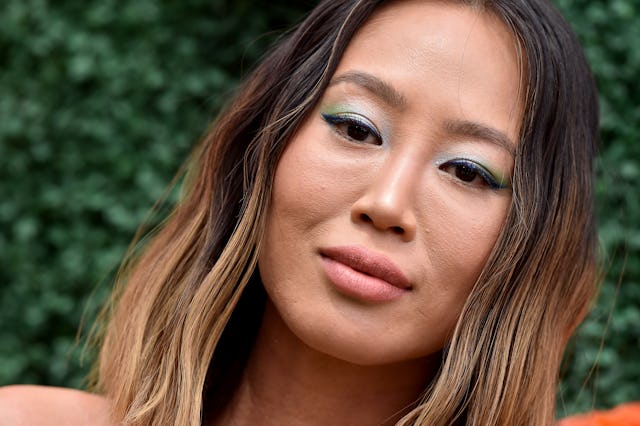Aimee Song Dives Deep Into Those Postpartum Days With New Video Series
The new mom and fashion influencer introduces Matrescence, an emotional look at the joys and challenges of the transition into motherhood.

Anthropologists have a word for the often-radical shift into motherhood: “matrescence.” This chapter of intense change is one — as many new moms can attest — of physical and emotional transformation, and can also be, quite truthfully, very hard.
In a new interview series, made in partnership with Perelel, fashion influencer and new mom Aimee Song — who welcomed son Teo Felix with partner Jacopo Moschin in February — sits down with reproductive psychiatrist Sarah Oreck to pull back the curtain on the realities of the postpartum experience.
Each video explores the nuances of the fourth trimester that moms, moms-to-be, and women hoping to be on the path to motherhood can relate to. Song and Oreck honestly discuss societal pressures on women and comparison culture, hormonal and body changes, self-identity after motherhood, and how to care for your mental health as a new mom.
“So many of us don’t speak openly about [new motherhood] or even realize the magnitude of what we're going through — including myself,” Song tells Scary Mommy, which is debuting the video series.
“I wasn’t familiar with the concept of matrescence until Perelel’s founding advisor, reproductive psychiatrist Dr. Sarah Oreck, introduced me to it. It was such an eye opening revelation and as soon as I started to learn more I knew we had to discuss this transition more openly and help educate women about the complexity of this stage of the motherhood journey that takes place throughout the fourth trimester,” she tells Scary Mommy.
Below, read more from our chat with Song and watch Episode 1 of Matrescence, titled “Self-Identity.”
Scary Mommy: What surprised you most about new motherhood and the postpartum experience? (What us moms call the fourth trimester.)
Aimee Song: The psychological changes I experienced, as well as my postpartum body, surprised me the most — it was all so new to me, as it is to many mothers going through the same experience. There’s an idealization of what motherhood should be like in society, but it’s just not realistic.
SM: We lose a bit of ourselves when we become mothers. How have you grappled with your own self-identity post-birth?
AS: Self-identity is something I’ve personally struggled with even before I became a mother. It was a big adjustment for me as I transitioned into motherhood, with having to establish a new routine or even coming to terms with not having a set routine. I was exclusively breastfeeding at first, so like many moms, I had to figure out how to balance being a mom, navigating my career since I only took one month family leave, and also prioritizing my own self-care.
SM: Breastfeeding. Feeding in general. What’s something you didn’t expect? How has your journey been?
AS: Breastfeeding was so hard for me. I did not realize how painful it would be and how willing I was to breastfeed him despite the pain and discomfort. I had developed a skin infection as my nipples turned raw, so I would hand squeeze 10 times a day for a week in the beginning until my skin healed and I was able to breastfeed again. My mental health was at an all-time low and I was already back at work. I was comparing myself to other working moms’ breastfeeding journeys, which was definitely not healthy.
Despite having a hard time breastfeeding, once Teo stopped taking the breasts and preferred bottles, I resorted to exclusive pumping and that was so isolating and unenjoyable. That feeling also made me feel like a bad mom and I felt guilty for complaining and feeling the way I was feeling. Eventually, I made the decision to stop pumping and turn to formula, and that decision was also hard.
SM: Tell me about your hardest day with newborn Teo?
AS: To be honest, every day in the beginning was so hard, so it was more like “hardest period.” We didn’t have help in the first two months of Teo and both my partner and I completely underestimated what caring for a newborn would be like. I also jumped back into work too fast so I felt like I wasn’t doing anything right. I felt like I was constantly disappointing my peers, my team, myself, my family.
SM: Now, tell me about the best day.
AS: Every morning when I wake up before him and pick him up from his bed, he has the biggest smile. He’s so happy to see us and that just puts me in the best mood.
SM: In your eyes, what is the one thing more moms need to know about bringing a baby home?
AS: The things you’re feeling are not unique to you — you are not alone. This experience made me learn that pregnancy and birth are one of the most significant hormonal changes you’ll experience in your life, and everyone reacts differently to those changes — but the through line is that everyone feels a shift.
Episode 1 of Matrescence, “Self-Identity.”
Watch another episode of Matrescence next week on Scary Mommy.
Quotes have been lightly edited and condensed for clarity.